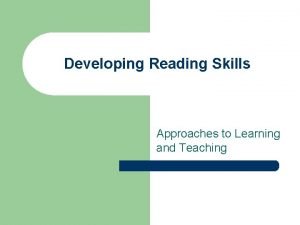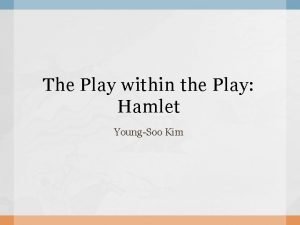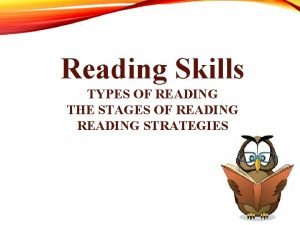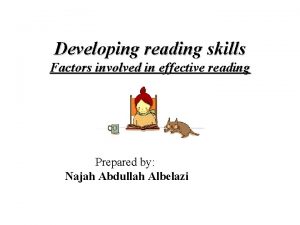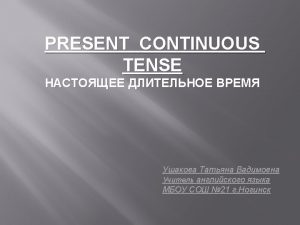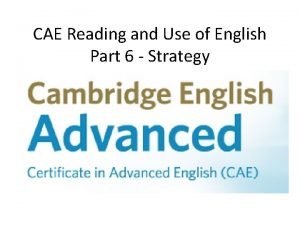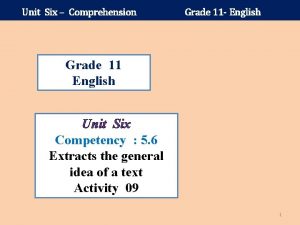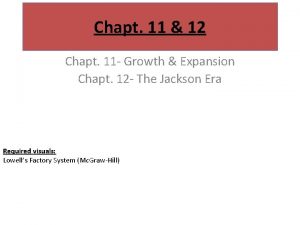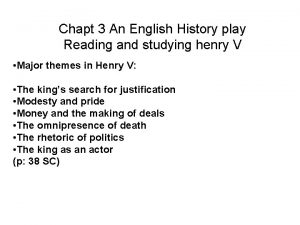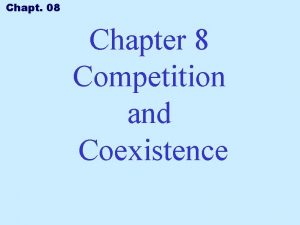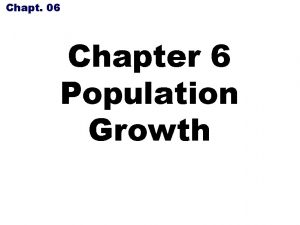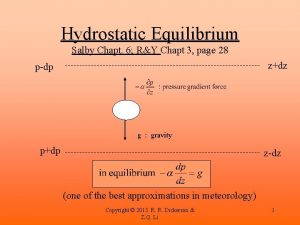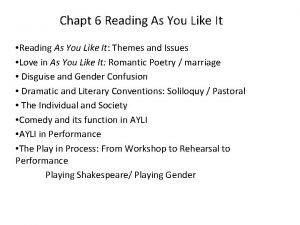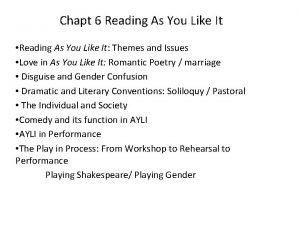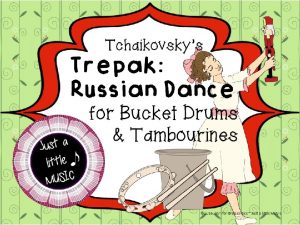Chapt 3 An English History play Reading and















- Slides: 15

Chapt 3 An English History play Reading and studying henry V • Major themes in Henry V: • The king’s search for justification • Modesty and pride • Money and the making of deals • The omnipresence of death • The rhetoric of politics • The king as an actor (p: 38 SC)

Chapt 3 An English History play Reading and studying henry V • King Henry IV has died and his son Prince Hal reigns. It's war with France and all England rises up to back the King. At the city of Harfleur, the King and his forces encounter stiff resistance and King Hal rallies his forces with the patriotic rallying speech • "Once more unto the breach, dear friends, once more. . . " • England is united under Henry's leadership and win Harfleur. He then goes on to win the Battle of Agincourt and the French King surrenders.

He offers Henry the hand of his daughter, Katherine of Valois, in marriage so uniting England France. After he marries Katherine, peace rules, and they have a son. However, after King Hal dies and his son becomes Henry VI, war again looms on the horizon.

• Henry is clearly a mastery of rhetoric (see his inspirational speeches to the troops; his pronouncements at court and in Southhampton; his wooing of Catherine). Can we take him seriously when he tells Katherine that he has no eloquence and speaks to her as would a "plain soldier"? Is she right to think "the tongues of men are full of deceits" (V. ii. 120)?

• To what extent is this play about the disjunction between appearance and reality and the related theme of deception? (consider e. g. • the French dauphin's misjudgment of Henry; • the "unnatural" treachery of Cambridge, Scroop and Grey; • the common soldiers' perception of their leader and his motives; • the Ceremony soliloquy • Henry's wooing of Katherine.

• Henry V demonstrates majesty of language (rhetoric of politics) in Henry’s famous speeches at Harfleur and Agincourt. • Its themes include: • coming of age, justice and mercy, appearance vs. reality, leadership, and the comradeship of men in arms. • Shakespeare’s depiction of Henry V as an ideal Christian king is instructive as to the nature of a good king, yet it is complex enough to allow a variety of questions to be raised about Henry’s real character. (cross reference to Henry IV)

• SYNOPSIS OF THE PLAY • The play can be divided into four main parts: • 1 - the events leading up to the war between the English and French forces • 2 - preparations for battle. • 3 - the actual battles. • 4 - the aftermath of the war.

• Elizabethan stages did not use scenery. Acknowledging the difficulty of conveying great battles and shifts of location on a bare stage, Shakespeare uses as narrator a Chorus (a reference to the Greek Chorus but played by a single actor), who explains the story to the audience and encourages them to use their imaginations

• The early scenes deal with the embarkation of Henry's fleet for France, and include a real-life incident in which the Earl of Cambridge and two others plotted to assassinate Henry at Southampton. Henry's clever uncovering of the plot and ruthless treatment of the plotters is one indication that he has changed from the earlier plays in which he appeared.

• As with all of Shakespeare's serious plays, there also a number of minor comic characters whose activities contrast with and sometimes comment on the main plot (discuss). In this case, they are mostly common soldiers in Henry's army, and they include Pistol, Nym, and Bardolph from the Henry IV plays. The play also deals briefly with the death of Falstaff, Henry's one time friend from the Henry IV plays.

• Before the Battle of Agincourt, victory looks uncertain, and the young king's heroic character is shown by his decision to wander around the English camp at night, in disguise (comment), so as to comfort his soldiers and find out what they really think of him. Before the battle begins, Henry rallies his troops with the famous speech.

Henry’s St. Crispin’s Day speech, the rallying oratory he delivers to the English army just before the Battle of Agincourt. • 4. If we are marked to die, we are enough To do our country loss; and if to live, The fewer men, the greater share of honour. God’s will, I pray thee wish not one man more. By Jove, I am not covetous for gold, . . . But if it be a sin to covet honour I am the most offending soul alive. No, faith, my coz, wish not a man from England. God’s peace, I would not lose so great an honour As one man more methinks would share from me For the best hope I have. O do not wish one more. Rather proclaim it presently through my host That he which hath no stomach to this fight, Let him depart. His passport shall be made And crowns for convoy put into his purse. We would not die in that man’s company That fears his fellowship to die with us… (IV. iii. 20– 39) (p: 132 -4 Henry V)

Henry’s response to the messenger who delivers the crate of tennis balls the Dauphin offers as a mocking reminder of Henry’s irresponsible youth. And tell the pleasant Prince this mock of his Hath turned his balls to gunstones, and his soul Shall stand sore chargèd for the wasteful vengeance That shall fly from them—for many a thousand widows Shall this mock out of their dear husbands, Mock mothers from their sons, mock castles down; . . . But this lies all within the will of God, To whom I do appeal, and in whose name Tell you the Dauphin I am coming on To venge me as I may, and to put forth My rightful hand in a well-hallowed cause. (I. ii. 281– 293) (p: 74 Henry V)

• 2. Once more unto the breach, dear friends, once more. . . Now set the teeth and stretch the nostril wide, Hold hard the breath, and bend up every spirit To his full height. On, on, you noblest English, Whose blood is fet from fathers of war-proof, Fathers that like so many Alexanders Have in these parts from morn till even fought, And sheathed their swords for lack of argument. Dishonour not your mothers; now attest That those whom you called fathers did beget you. Be copy now to men of grosser blood, And teach them how to war. And you, good yeomen, Whose limbs were made in England, show us here The mettle of your pasture. . . (III. i. 6– 27) (p: 96 Henry V)

Soliloquy • • • Upon the king… Tis not the balm, the sceptre, and the ball, The sword, the mace, the crown imperial, The intertissued robe of gold and pearl, The farcèd title running fore the king, The throne he sits on, nor the tide of pomp That beats upon the high shore of this world— No, not all these, thrice-gorgeous ceremony, Not all these, laid in bed majestical, Can sleep so soundly as the wretched slave Who with a body filled and vacant mind Gets him to rest, crammed with distressful bread; . . . And but for ceremony such a wretch, Winding up days with toil and nights with sleep, Had the forehand vantage of a king. The slave, a member of the country’s peace, Enjoys it, but in gross brain little wots What watch the King keeps to maintain the peace, Whose hours the peasant best advantages. (IV. i. 242– 277) (p: 126 -8 Henry V)
 While reading activities
While reading activities I've got a friend we like to play we play together
I've got a friend we like to play we play together Louise made the chocolate cake active or passive
Louise made the chocolate cake active or passive Play by play
Play by play Hamlet kim
Hamlet kim Aims of teaching reading
Aims of teaching reading Characteristics of skimming reading
Characteristics of skimming reading Intensive reading and extensive reading
Intensive reading and extensive reading Extensive reading
Extensive reading Intensive reading and extensive reading
Intensive reading and extensive reading Dgp week 9 answers
Dgp week 9 answers I read a book present continuous tense
I read a book present continuous tense Reading robot phonics play
Reading robot phonics play Work hard have fun make history amazon
Work hard have fun make history amazon Cae reading
Cae reading English comprehension grade 11
English comprehension grade 11
